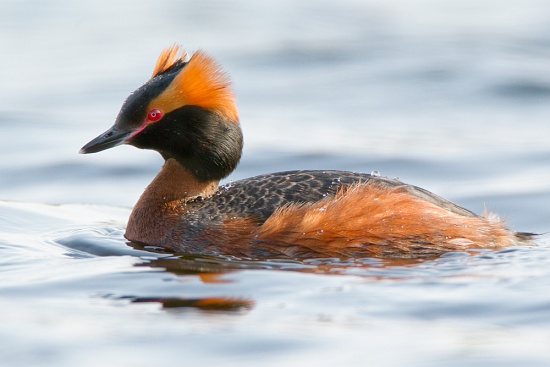Alternative Name: Slavonian Grebe

Photo by scottishdude
Central Highlands, Scotland, April 2011
- Podiceps auritus
Identification
A medium-sized grebe; length 31-38 cm (12¼-15 in), wingspan 46-60 cm, weight 300-470 g
All year:
- White belly
- Vivid red iris
- Strong, straight black bill with pale tip
- Blackish or grey legs
Summer adult:
- Black above
- Chestnut neck, breast and flanks
- Black head
- Chestnut lores continuing in a line over the eye
- Orange-yellow to golden-yellow tuft ('horns') towards nape
- Dark brown hindneck
- Sides and front of nest chestnut
Winter adult:
- Black above
- White below
- Gleaming white cheeks with sharp contrast to black crown at eye level
- Peak of crown at rear of head
First-winter:
- As winter adult but some grey marks on cheeks
Similar species

Photo by J G Tippett
Columbia River, Kennewick, Washington, USA, April 2013
None in breeding plumage. Winter Black-necked Grebes can be confused, particularly with first-winters, but have even duskier cheeks, with black extending diffusely well below the eye level; they are also smaller, with an up-tilted bill lacking the pale tip, and the peak of the crown at middle of the head. Winter Red-necked Grebe is larger, with grey cheeks and a yellow-based bill.
Distribution

Photo © by Joseph Morlan
San Leandro Creek Mouth, Oakland, California, USA, 7 June 2021
Breeds in cool temperate to subarctic regions of North America and Canada, Iceland, the Faroe Islands, Scotland (rare), Scandinavia, Russia, and northernmost China. Winters mostly at sea on inshore waters a short distance south of the breeding range, less often on large lakes and rivers.
Taxonomy
Subspecies
Two subspecies are accepted:[1]
- P. a auritus (Slavonian Grebe)
- Europe & Asia. 'Horns' orange.
- P. a cornutus (Horned Grebe)
- North America. 'Horns' yellow.
Habitat
Small lakes and ponds in summer; the sea, large lakes, and slow-flowing rivers in winter.
Behaviour
Breeding
It builds a nest of vegetation in shallow water. 3-5 eggs are laid incubated mainly by the female for 22-25 days.
Diet
Diet includes aquatic insects and their larvae, small fish and crustaceans taken in 30-35 second dives.
Vocalisation
Variety of calls when breeding including a long trill.
References
- Clements, J. F., T. S. Schulenberg, M. J. Iliff, D. Roberson, T. A. Fredericks, B. L. Sullivan, and C. L. Wood. 2017. The eBird/Clements checklist of birds of the world: v2017, with updates to August 2017. Downloaded from http://www.birds.cornell.edu/clementschecklist/download/
Recommended Citation
- BirdForum Opus contributors. (2025) Horned Grebe. In: BirdForum, the forum for wild birds and birding. Retrieved 3 May 2025 from https://www.birdforum.net/opus/Horned_Grebe
External Links
GSearch checked for 2020 platform.1




